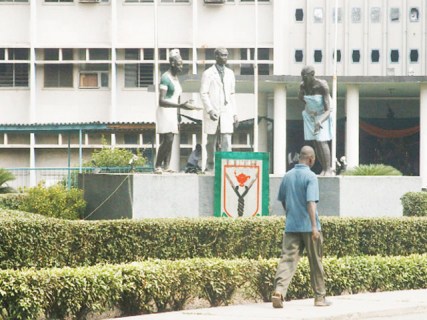Stakeholders in Nigeria’s health sector have called for efficient funding of the healthcare system to ensure affordable, accessible and quality care for citizens.
The stakeholders made the call in New York in a communique issued after a side event on ‘Impact of Corruption and Lack of Accountability in the Implementation of the Sustainable Development Goals (SDGs) in Nigeria.
Mr Auwal Rafsanjani, the Executive Director of Civil Society Legislative Advocacy Centre (CISLAC) observed that there was poor financial and political commitments toward addressing the healthcare challenge in the country.
Rafsanjani said CISLAC had engaged several Federal and State legislators in the past, especially on the need to prioritise funding for healthcare.
He stressed the need to continuously engage relevant stakeholders to draw political will necessary for prioritising funding for healthcare and specifically nutrition, which impact women and children.
He called on relevant financial institutions and government bodies to exhibit high level of seriousness in the fight against corruption and steer the ship of sustainable development.
Nigeria’s Permanent Representative to the UN, Prof. Tijjani Muhammad-Bande, observed that promoting government’s anti-corruption efforts was the panacea toward solving the country’s developmental issues, including health.
Represented by Mr Muyiwa Onifade, Muhammad-Bande said that asset recovery and repatriation of funds to Nigeria would go a long way toward addressing and implementing the SDGs.
The Nigerian envoy stressed that asset recovery was long over-due in Nigeria and stressed the need for bilateral relations with other countries to fast-track the process.
He urged civil society groups to continue with the struggle against corruption, saying it would lead to achieving universal health coverage and sustainable development.
Sen. Olanrewaju Tejuosho in his presentation on “the Role of Parliament in Improving Domestic Investment in Nutrition’, narrated the effects of malnutrition.
He listed impaired brain development and low Intelligence Quotient, low productivity, increased healthcare cost, weak immune system, high risk of diabetes, cancer and stroke, among others, as effects of malnutrition.
According to him, every dollar spent on nutrition has a dividend of 16 dollars, adding that everyday Nigeria losses about 2,300 children under the age of five and 145 women of childbearing age due to malnutrition.
Investment in nutrition, he said, was crucial to the achievement of SDGs, saying it was required for increased productivity, reduced cost of health, reduced child mortality and increased productivity and economic growth.
Mr Hilary Ogbonna, who deliberated on ‘Citizens’ Perspectives in Promoting Accountability and Investment on the SDGs using My World Survey’, presented a survey held by millions of people across the globe to ascertain which of the SDGs they require most.
Ogbonna observed that if SDGs was properly implemented, it would lift millions of people out of poverty.
Mr Okeke Anya, the Programme Manager, Democratic Governance, in his presentation on ‘the Challenges of Implementation of the SDGs’, said there was so much waste of money by government which would have been channelled to implementing the SDGs and providing quality health to the people.
Anya regretted that the issue of money laundering was a major setback in Nigeria, pointing out, however, that there were some improvements in terms of conviction of politically exposed persons. (NAN)



Leave a Reply